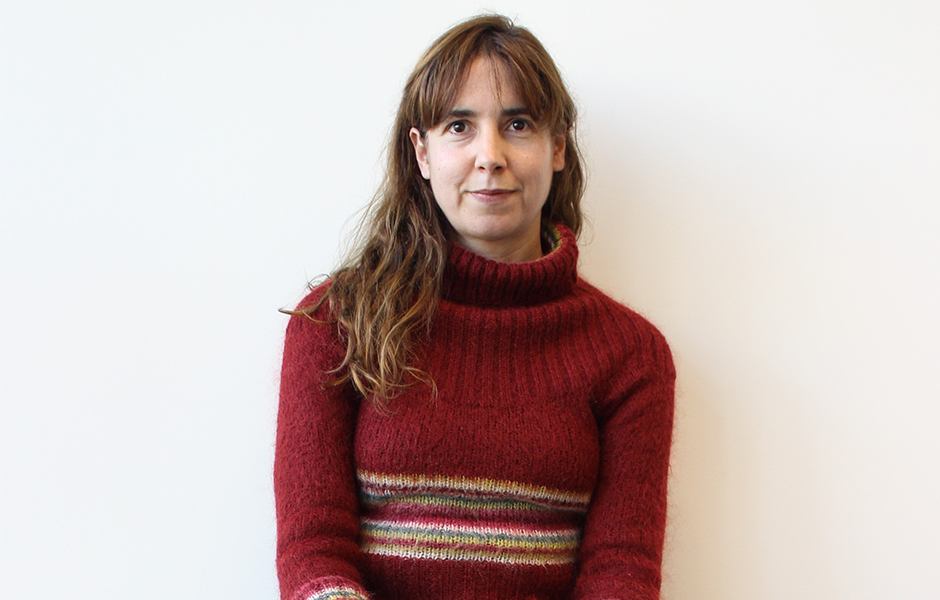Irene Carvalho is an integrated researcher of the NeuroGen group – Neuronal Degeneration and Regeneration of the Thematic Line 2 – Clinical & Translational Research of CINTESIS, at the Faculty of Medicine of the University of Porto (FMUP).
She was born and raised in Santa Maria da Feira, but she studied in Porto, a city she feels like her own. Her first love was Veterinary Medicine, but she quickly realized that “she didn’t have the guts to endure the suffering of animals” and so she knew that her calling was Psychology.
“In the area where I lived, there were many drug addicts and I felt compelled to equip myself with tools to be able to intervene and help. I thought I necessarily had to go to psychology. Of course, when we go to college, we have many illusions. We think we are going to solve the world’s problems. Then we realized that not everything goes smoothly and that sometimes, our biggest efforts fail. This is a difficult lesson to learn in the course of our lives ”, she says.
In 1991, she graduated from the Faculty of Psychology and Educational Sciences of the University of Porto (FPCEUP), specializing in the area of deviant behavior. After her internship, she worked for about three years on a social reintegration project aimed at people with delinquent behaviors and at risk. In 1995, she left for the United States of America to study her Ph.D. at the Northwestern University.
“This was the culmination of several dreams: studying abroad, doing a Ph.D., and studying deviant behavior, an area in which the Chicago School was a world reference”, she recalls.
She carried out research in social districts with a high degree of criminal danger in Chicago and was surprised because the American reality did not correspond to the image she had from movies. “The American society was very conservative and racially segregated. I was not prepared for that and there was, in fact, a culture shock. But my investigation went very well,” she says.
After completing her doctorate in 2003, she returned to Portugal. There she quickly began her path towards an academic career. She started teaching at the Universidade Lusíada and in 2004 she became a professor of the Faculty of Medicine of the University of Porto (FMUP) where she is currently an Assistant Professor. She dedicates herself entirely to teaching and researching, embracing other areas, with emphasis on Clinical Communication.
“Fortunately, I can say that I am curious about many things. I am still interested in deviant behaviors. My professional path has benefited from certain aspects of my previous field of study. Aspects such as communication, applied to the context of clinical criminology or more recently, addiction to gambling”, she adds.
She joined CINTESIS in 2015, in the group then coordinated by Dulce Madeira and now by Armando Cardoso. She was in the ioGeneration project, led by Conceição Calhau, where she studied the relationship between iodine intake and cognition/behavior. Currently, she has a project to start in the area of Clinical Communication, which was joined by Paulo Santos, from the PrimeCare research group, also from CINTESIS. The COVID-19 pandemic, which has posed new challenges to this type of communication (the effective framing of information to change behaviors for health, the use of masks, the impossibility of touching, physical distance), provides a sort of “background” for this project. But this is really a broader project.
Irene Carvalho is also co-founder and current president of the Portuguese Society for Clinical Communication in Health Care (SP3CS), created in 2016, which has had the support of CINTESIS. Some of the topics they investigate are the communication of bad news (which is designated as “a competence that is taught and learned”), empathy and emotions in clinical practice, the understanding of metaphors, or the patient-focused approach.
“There is still a lot to investigate, for example, about communicating bad news, making decisions, the role of technology, and the effect of wearing masks in offices. Conveying bad news in a humane way is always complicated and is even more complicated if your have to do it by telephone, video call, or with masks and other personal protective equipment, which keep them away, which do not recall proximity”, admits the researcher. That is why, she says, it must be a “competence that is taught and learned and not a matter of common sense”.
1-Year Ambition
This question is very difficult for me. I don’t usually make plans, it is not my nature. With this circumstance, making predictions becomes even more difficult. My goal would be to get everyone back to normal.
10-Year Ambition
I don’t even think about it! I can say that I do not foresee any kind of break in my life. I would say that my goal is to continue doing what I have been doing.
Life Beyond Teaching and Research
I like listening to music, watching movies, and reading. With the investigation, I lost my old reading habits. From time to time, I still play the piano (I studied at the Conservatory). I also enjoy traveling, visiting other places, and physical activity. I’ve been practicing viet-vo-dao (a martial art) since I was 17 and I dive, but I haven’t practiced in the last few months. At this stage, fortunately, I continue to listen to music and watch films, which allows me to face confinement.

